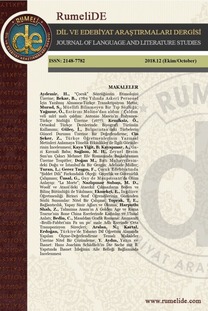Ölümlülüğün veya Sonsuzluğun Işığında Shakespeare'in Sonelerinin Lacancı Bir İnceleme
Shakespeare soneleri, Rönesans döneminin en ünlü soneleri olarak düşünülür. Bu şiirlerinde Shakespeare, sadece sonenin biçimini sadece İtalyan eşdeğerinin farklı kombinasyonuyla değiştirmekle kalmaz, aynı zamanda aşkın kimliğine çağdaşlarından farklı bir bakış açısıyla yaklaşır. Nitekim Shakespeare aşkın kimliğinin; zaman, güzellik, ölüm ve ölümsüzlük gibi kavramlara bağlı olduğunu düşünür. Bu aşamada, zaman çizgiseldir ve âşık yeni metaforlar kullanarak sürekli olarak güzelliği ve aşkını ölümsüzleştirmeye çalışır. Böylece, görünüşte Shakespeare'in, aşık ile sevilen arasındaki ilişkide aynı platonik tutumu tekrarladığı anlaşılır. Ancak Jacques Lacan'ın psikanalitik analizinde âşığın ölüm ve sonsuzluk ikili zıtlığına kapıldığı görülmektedir. Diğer bir ifadeyle, âşığın sevdiği kişinin sonsuzluğu için çabası durdurulur ve şiir dizelerinde ebedîlik sürekli ertelenen gelecekteki bir zamana dönüşür. Bu makale, aşkın kimliğini ve zaman ile ilişkisini inceledikten sonra, Shakespeare sonelerinin aşkın zamansızlığına mı ya da hiçlik ve ölüme mi önem verdiği sorusunu yanıtlamayı amaçlamaktadır.
Anahtar Kelimeler:
Ölüm, Ölümsüzlük, Jacques Lacan, Aşk, Psikanaliz, Yeniden Oluşma, Shakespeare Soneleri
A Lacanian Scrutiny of Shakespeare’s Sonnets in the Light of Mortality or Eternity
Shakespearean sonnets are conceived to be the most renowned sonnets of the Renaissance era. In these poems, Shakespeare not only changes the appearance of the sonnet with a different combination of its Italian counterpart, but also looks at the identity of love with a distinct perspective from his contemporaries. Indeed, Shakespeare sees the identity of love as tied to concepts such as time, beauty, death and imperishability. Here, time is linear and the lover, using new metaphors, constantly tries to immortalize beauty and his love. In this way, on the surface, it seems that Shakespeare repeats the same Platonic attitude in the relationship between the lover and the beloved. But in the psychoanalytic analysis of Jacques Lacan, it can be seen that the lover is caught in the double chain of death and eternity. In other words, the lover's effort for the beloved's everlastingness is suspended and perpetuity becomes a time in the future that is constantly postponed in the lines of the poem. After examining the identity of love and its relationship with time, this article aims to answer the question that whether Shakespearean sonnets pay attention to the timelessness of love or at nothingness and death.
Keywords:
Death, Immortality, Jacques Lacan, Love, Psychoanalysis, Regeneration, Shakespearean Sonnets.,
___
- Brenkman, J. (1997). ‘The Other and the One: Psychoanalysis, Reading the Symposium,’ Literature and Psychoanalysis: The Question of Reading Otherwise, ed. Shoshana Felman Yale French Studies 55/56, pp. 396‐456.
- De Grazia, M. (1999). “The Scandal of Shakespearean Sonnets” in Shakespearean Sonnets: Critical Essays. James Schiffer, ed. New York: Garland Publishing Inc.
- Dubrow, H. (1995). Echoes of Desire: English Petrarchism and Its Counterdiscourses. Ithaca and London: Cornell University Press.
- Duncan‐Jones, K. (1998). ed. Shakespearean Sonnets. The Arden Shakespeare, 3rd series. Italy: Thomson Publishing Company.
- Herman, P, C. (1999). “What’s the Use? Or The Problematic of Economy in Shakespearean Procreation Sonnets” in Shakespearean Sonnets: Critical Essays. James Schiffer, ed. New York: Garland Publishing Inc.
- Lacan, J. (1979). The Four Fundamental Concepts of Psychoanalysis, Jacques‐Allen Miller, ed., Alan Sheridan, trans. Harmondsworth: Penguin Books Ltd.
- Lacan, J. (1988). The Seminar of Jacques Lacan: Book II. The Ego in Freud’s Theory and in the Technique of Psychoanalysis, 1954‐1955, Jacques‐Alain Miller, ed., Sylvia Tomaselli, trans. Cambridge: Cambridge University Press.
- Lacan, J. (1992). The Seminar of Jacques Lacan: Book VII. The Ethics of Psychoanalysis, 1959‐1960, Jacques‐Alain Miller, ed., D. Porter, trans. London: Routledge.
- Mischo, J, B. (1995). “That Use is not forbidden usury’: Shakespearean Procreation Sonnets and the Problem of Usury,” in Subjects on the World’s Stage: Essays on British Literature of the Middle Ages and the Renaissance. David G. Allen and Rober A. White, eds. Newark: University of Delaware.
- Schiffer, J. (2000). Shakespearean Sonnets: Critical Essays. New York: Garland Publishing Inc.
- Shakespeare, W. (1998). Shakespearean Sonnets. Katherine Duncan‐Jones, ed. England: Thomson Publishing Company.
- Yandell, C. (1994). ‘Carpe Diem, Poetic Immortality, and the Gendered Ideology of Time,’ in Renaissance Women Writers: French Texts/American Contexts. Anne R. Larsen, and Colette H. Winn, eds. Detroit: Wayne State University Press.
- ISSN: 2148-7782
- Yayın Aralığı: Yılda 6 Sayı
- Başlangıç: 2014
- Yayıncı: Yakup YILMAZ
Sayıdaki Diğer Makaleler
Koku hafızası bağlamında “Sümbül Kokusu” ve Odun Kokusu adlı eserler üzerine bir inceleme
Türkçe ders kitaplarındaki metinlerin okunabilirlik özelliğinin incelenmesi
Alman ulusal kimliğinin dil merkezli inşası
Javier Marías’ın Los Enamormientos adlı romanında doğal olmayan anlatı biçimleri
Seyf-i Sarayî’nin Gülistan Tercümesi’nde olumluluk-olumsuzluk ulamı
İnsanî gurbetin arkaik bir örneği: İnci İlahisi
Yavuz Bülent Bâkiler’in Üsküp’ten Kosova’ya adlı eserine yansıyan Balkan coğrafyası
